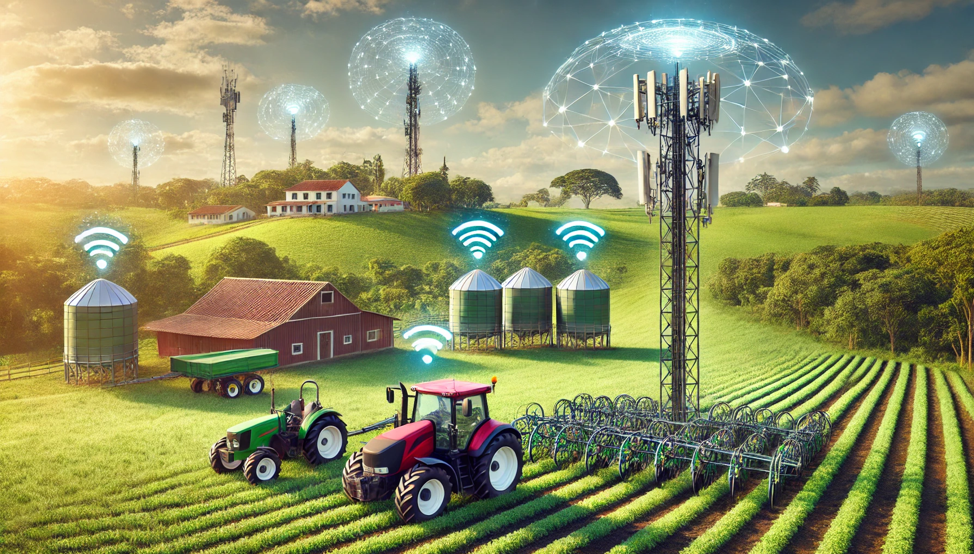The Economic Impact of Enhanced Connectivity on Brazil’s Agribusiness
In the verdant expanses of Brazil, the heartbeat of its economy often thrums in rhythm with the agricultural sector. This vital industry is not just a contributor but a cornerstone to the nation’s GDP and export revenue. Yet, beneath this thriving canopy lies a stark reality: many rural areas are still shrouded in digital darkness, cut off from the connectivity that could revolutionize their agricultural practices. It’s here that the telecom industry steps in, a beacon of progress aiming to bridge the divide and catalyze economic prosperity within agribusiness.
The Current Landscape
Picture a farmer in the remote reaches of Brazil, tilling extensive lands but tethered to antiquated methods, all due to the absence of internet access. A staggering 70% of rural properties in Brazil share this plight, deprived of utilizing cutting-edge technological advancements. This gap not only stifles productivity but also limits access to critical data and tools designed to refine farming operations.
The Telecom Industry’s Role
Telecom companies have cast their gaze upon the vast potential lying dormant in rural Brazil. By expanding their networks to these regions, they’re not merely opening up new revenue streams but significantly empowering the agricultural sector. Consider Sol Internet of People as a shining example—this trailblazer has erected hundreds of towers, weaving a web of coverage that paves the way for sophisticated farming technologies.
Boosting Productivity with Connectivity
Imagine the transformation when enhanced connectivity brings real-time data on weather, soil conditions, and crop health right into the hands of farmers. It’s akin to having an advanced digital assistant amidst the crops, offering sage advice for informed decision-making. IoT devices now vigilantly monitor soil moisture and autonomously control irrigation systems, fostering optimal water usage and thriving crops.
Tractors and harvesters, now guided by GPS and connected to the grid, glide through fields with newfound efficiency, curbing fuel consumption and labor costs. Drones and satellites cast their eyes from above, granting farmers a meticulous view of their crops, ensuring fertilizers and pesticides are used with precision. These innovations, underpinned by strong telecom networks, promise to amplify both productivity and profitability in agriculture.
Economic Benefits
The ripple effects of improved connectivity in agribusiness are substantial. Farmers can escalate their yield and enhance the quality of produce, translating to increased revenue. Diminished operational costs and heightened efficiency further inflate their profit margins.
Moreover, this digital awakening grants farmers entry into previously inaccessible markets. Online marketplaces become their new trading floors, connecting them with buyers far and wide, securing more favorable prices for their harvests. Financial services, too, are now just a click away, with online banking and microfinance providing the capital needed for investing in groundbreaking technologies and equipment.
Empowering Rural Communities
The influence of enhanced connectivity goes beyond individual farms and permeates entire rural communities. With better internet access, residents gain improved education, healthcare, and social services. Telemedicine delivers specialized care to isolated locales, while e-learning platforms unlock doors to knowledge that once seemed out of reach.
Connectivity also fosters social inclusion, keeping rural inhabitants interwoven with family, friends, and the broader world. Entertainment, economic, and social activities are now at their fingertips, helping curb urban migration and preserving the local workforce and economy.
Case Study: Sol Internet of People
Sol Internet of People stands as a testament to the pivotal role of the telecom industry in rural Brazil. With over 450 towers casting their signals across millions of hectares, Sol collaborates with agriculturalists and industry leaders, delivering not just connectivity but a suite of services that elevate productivity and efficiency.
Farmers allied with Sol report marked enhancements in yields and operational effectiveness. The real-time management and automation of farm equipment have led to savings and increased production. Additionally, the gateway to global markets and financial services has unfurled new avenues for revenue and investment.
Overcoming Challenges
Despite the clear upsides, extending telecom infrastructure into rural landscapes is fraught with challenges. Installation and upkeep costs, juxtaposed with sparse populations, can dissuade investments. Yet, inventive business models and partnerships offer solutions.
Sol’s creative approach involves partnering with rural producers who provide land for tower installations at no charge, receiving connectivity and added services in return. This symbiotic strategy mitigates costs and encourages widespread adoption.
Government backing and regulatory incentives are also pivotal, with subsidies, tax breaks, and simplified procedures enticing telecom companies to invest in rural expansion.
The Future of Agritech in Brazil
As we gaze into the horizon, the prospects for Agri-tech innovation in Brazil are boundless. With ongoing enhancements in connectivity, such as the deployment of 5G networks, farmers will be poised to adopt even more sophisticated technologies, pushing the boundaries of smart farming.
As the telecom industry continues to extend its reach into the Brazilian hinterlands, the economic impact on agribusiness is set to soar. Increased productivity, profitability, and market access will propel sustainable growth in the sector, bolstering Brazil’s stature as a global agricultural titan.
Conclusion
The concerted efforts of the telecom industry to illuminate rural Brazil with connectivity are reshaping the agricultural landscape. By laying down the necessary infrastructure and services, telecom companies are empowering farmers to wield the might of modern technology, elevating productivity and profitability. The economic advantages are clear, with enhanced connectivity fueling advancement in agribusiness and beyond.
Through pioneering solutions and alliances, the telecom industry is unlocking the latent potential of Brazil’s rural expanses. As this movement marches forward, the future of Brazilian Agri-tech shines bright, promising substantial benefits for farmers, rural communities, and the national economy alike.

